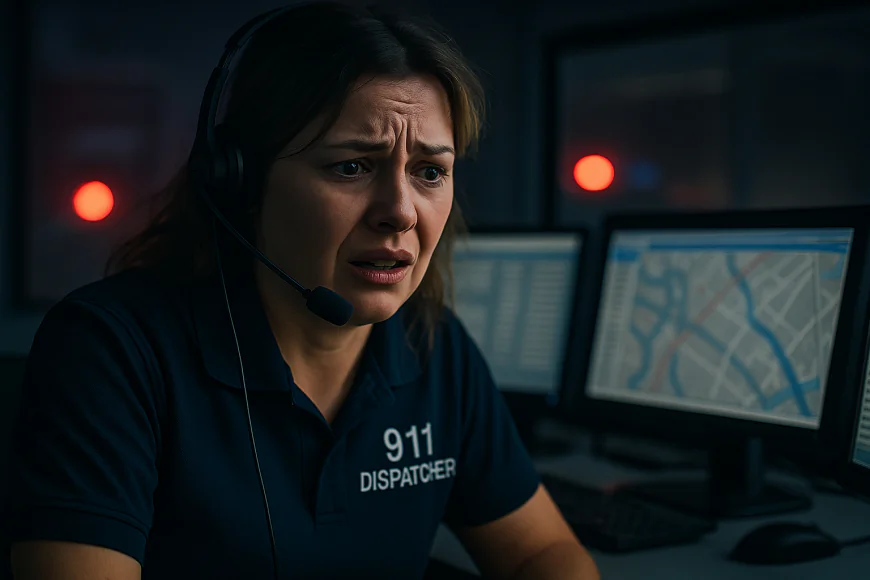📞 911 Dispatchers: The Voices That Carry You Through Chaos
They don’t wear uniforms. They don’t race down streets with sirens blaring. But when your world is falling apart, they’re the first voice you hear—and often, the last one holding you together.

911 dispatchers are the invisible lifelines of emergency response. They guide people through heart attacks, home invasions, suicides, and car crashes. They absorb panic, translate chaos into action, and send help into the unknown—all while sitting behind a headset, unseen and often unthanked.
This is their story.
🧠 The Job You Think You Know
Most people imagine dispatchers as calm voices reading from scripts. But the reality is far more intense.
-
They field hundreds of calls per shift, often with no breaks.
-
They must triage emergencies in seconds, deciding who gets help first.
-
They give life-saving instructions—CPR, childbirth, bleeding control—without ever seeing the scene.
-
They stay on the line while people die, scream, beg, or go silent.
And when the call ends, they take the next one. There’s no time to grieve, decompress, or cry.
“I had to talk a child through hiding from her abusive father. She whispered from a closet while he smashed things outside. I stayed calm. I stayed with her. Then I took the next call.” — Dispatcher, anonymous
🧨 The Emotional Toll
Dispatchers face trauma secondhand—but it’s no less real.
-
Vicarious trauma: Hearing others’ pain over and over can cause PTSD-like symptoms.
-
Compassion fatigue: Constant exposure to suffering can numb empathy or trigger burnout.
-
Moral injury: When help doesn’t arrive in time, dispatchers often blame themselves.
Studies show:
-
Up to 24% of dispatchers meet criteria for PTSD.
-
Nearly 1 in 5 report clinical depression.
-
Burnout rates are rising—especially among dispatchers with 5–10 years of experience.
“I’ve heard people take their last breath. I’ve heard children scream for parents who didn’t survive. And I’ve had to keep going like nothing happened.” — Dispatcher, anonymous
⏱️ The Pressure of Every Second
Dispatchers must make split-second decisions with limited information.
-
A caller might be incoherent, hysterical, or in danger.
-
Location data might be vague or wrong.
-
The dispatcher must stay calm, ask the right questions, and send the right help—fast.
Mistakes can cost lives. And the weight of that responsibility never goes away.
“You’re the voice between life and death. You don’t get to freeze. You don’t get to panic. You just act.” — Dispatcher, anonymous
🕵️♀️ The Lack of Closure
Unlike paramedics or police, dispatchers rarely know how a call ends.
-
Did the child survive?
-
Did the overdose reverse?
-
Did the officers arrive in time?
Most never find out. That lack of closure creates lingering anxiety, guilt, and emotional residue.
“I still think about the woman who whispered ‘He’s coming’ before the line went dead. I never found out what happened.” — Dispatcher, anonymous
🧤 The Human Cost Behind the Calm
Dispatchers are often underpaid, understaffed, and overlooked.
-
Many work 10–12 hour shifts, including nights, weekends, and holidays.
-
Breaks are rare. Calls are constant.
-
They’re classified as clerical workers in many states—not first responders.
-
Mental health support is limited or nonexistent.
Yet they’re expected to carry the emotional weight of entire cities.
“We’re the first responders no one sees. But we feel everything.” — Dispatcher, anonymous
🎧 Real Calls, Real Impact
Here are just a few examples of what dispatchers face:
-
A woman hiding from her abusive partner, whispering from a closet.
-
A child calling 911 while their parent overdoses.
-
A man threatening suicide, gun in hand, while the dispatcher talks him down.
-
A caller screaming for help after a car crash—then going silent.
These aren’t movie scenes. They’re daily reality.
🧭 What Needs to Change
Dispatchers deserve more than praise. They deserve protection.
-
Reclassify dispatchers as first responders—with access to benefits, mental health care, and hazard pay.
-
Fund mental health programs: Peer support, counseling, and debriefing should be standard.
-
Improve staffing and scheduling: No one should work 12 hours without a break.
-
Raise public awareness: Dispatchers aren’t just voices. They’re lifelines.
“We’re not just answering phones. We’re holding lives together.” — Dispatcher
📣 Final Thought
911 dispatchers are the voices that carry us through chaos. They hear our worst moments. They guide us through fear. They stay calm so we can survive.
It’s time we see them—not just as voices, but as heroes.
“You don’t see them. But you hear them. And sometimes, that’s enough to save a life.” — USAYE
🔗 Fact-Check Sources
| Claim | Source |
|---|---|
| Up to 24% of 911 dispatchers meet criteria for PTSD | NeuroLaunch |
| Dispatchers often work 10–12 hour shifts with limited breaks | FHE Health |
| Dispatchers are not classified as first responders in many states | Stanford Center for Racial Justice |
| Burnout affects up to 30% of emergency dispatchers | NeuroLaunch |
| Dispatchers rarely receive closure on emergency outcomes | VICE |
| Dispatchers face vicarious trauma and moral injury | Police1 |
| Dispatchers are often underpaid and overlooked | ABC News |
What's Your Reaction?
 Like
0
Like
0
 Dislike
0
Dislike
0
 Love
0
Love
0
 Funny
0
Funny
0
 Angry
0
Angry
0
 Sad
0
Sad
0
 Wow
0
Wow
0




























